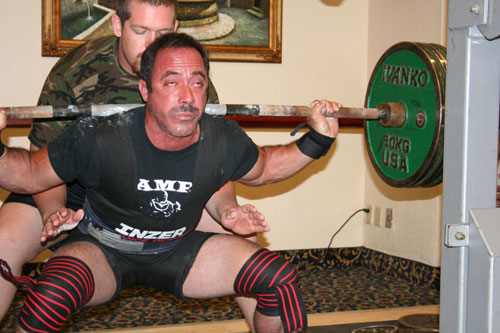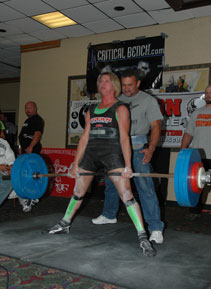You might not recognize the name, but you may be familiar with the effects of Central Nervous System (CNS) Fatigue. The symptoms of CNS Fatigue can include lack of motivation, poor mood, impaired cognitive ability and abnormally high perceptions in regards to the force of exertion-that is, we think we're working out a lot harder than we actually are. These are the most obvious symptoms, but there are other less evident ones too.
You already know that the central nervous system is what controls our body's functions, which includes muscle contractions. The theory behind CNS Fatigue is that there are not one, but two points from which our muscles can become fatigued: 1) in the muscle itself; and 2) at the point of origin of the muscular contraction (the central nervous system). Fatigue in the muscle itself is referred to as peripheral fatigue while fatigue at the point of origin is known as central fatigue.
We're all familiar with peripheral fatigue and what to do about it-proper nutrition, supplementation and allowing sufficient time for recovery between training sessions. But how do you manage fatigue that starts deep down in the brain and hits before it even gets to the muscle? That's a mystery that researchers have been working to unravel over the past several years and fortunately, they've made a lot of headway.
Just like everything else in our bodies, the central nervous system needs fuel to keep it going. If that system is running low on fuel, then performance-including muscle function-is hampered. Specifically, the function of the neurotransmitters-which are responsible for sending signals from the brain to the muscles-are impaired. This would also result in the onset of the psychological symptoms (poor mood, lack of motivation, etc.) mentioned above. Just like the muscle systems, the central nervous system can run out of fuel due to overexertion or lack of nutrition. Some powerlifters and strongmen competitors are particularly susceptible to CNS Fatigue due to the fact that they often do so many single repetition lifts. This can overly stress the nervous system, cause it to "run out of fuel" and can result in the onset of CNS Fatigue.
Much of the research into CNS Fatigue has focused on Serotonin (5-HT) and Dopamine due to their roles in regulating things like sensory perception, mood and more. Research suggests that an imbalance in these neurotransmitters-specifically, a spike in Serotonin and a drop in Dopamine levels-is associated with the onset of CNS Fatigue. The theory is the high 5-HT/low Dopamine brings on CNS Fatigue with low 5-HT/high Dopamine resulting in enhanced performance. That is really good news because proper training, nutrition and supplementation can help manage Serotonin/Dopamine levels in our brains.
Proper training means making sure that your body has plenty of time to rest and recover between workout sessions. It's not only the muscle systems that need to recover, but the central nervous system as well. That's only logical given that the symptoms of overtraining are not just physical, but mental too-and exactly like the psychological effects associated with CNS Fatigue. In terms of overtraining, researchers have looked at both insufficient recovery time between training sessions as well as prolonged periods of physical activity, with the presumption being that both result in the onset of CNS Fatigue.
It's actually very complex, but in layman's terms, on the nutrition side research has mostly focused on carbs and
Branched Chain Amino Acids (BCAAs) and their impact on the 5-HT/Dopamine balance in the brain. Carbs are thought to play an important role in combating the onset of CNS Fatigue due to their impact on fatty acid (FA), tryptophan (TRP) and free tryptophan (f-TRP) levels in the body, all of which are related to 5-HT/Dopamine levels in the brain. Increases in BCAA intake are thought to suppress 5-HT metabolism in the brain during exercise. So in theory, the combination of the two (carbs/BCAAs) should help to maintain the proper balance of 5-HT/Dopamine levels, helping to prevent the onset on CNS Fatigue.
Our nervous systems are incredibly complex and research into CNS Fatigue is still in the early stages so there are no definitive answers. We do know though that for regular bodybuilders, proper training (with plenty of recovery time between sessions) and nutrition can help avoid CNS Fatigue. Powerlifters and strongman competitors should be particularly careful to not overtrain and they may also have to deload or work in some down weeks too if symptoms of CNS Fatigue appear.
More Information About Muscle Building Click Here
Source 4 Foods Never To Eat
Source 4 Foods Never To Eat


No comments:
Post a Comment